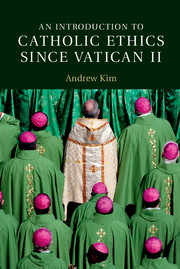Introduction
Published online by Cambridge University Press: 05 May 2015
Summary
While distrustful souls see nothing but darkness falling upon the face of the earth, we prefer to restate our confidence in our Savior, who has not left the world he redeemed.
St. John XXIII, Humanae salutis no. 4On December 25, 1961, John XXIII solemnly convoked the Second Vatican Ecumenical Council by promulgating the Apostolic Constitution, Humanae salutis (Of Human Salvation). In this document, the Pope calls attention to “a crisis happening within society.” It is, in several important respects, an ethical crisis, in response to which the Church is to discern “the signs of the times” with a view toward elucidating Christian hope to a world that has grown forlorn in the face of so much despair. Fifty years after the conclusion of the council, therefore, it is worth reexamining the ethical dimensions of the crisis itself as well as responses to it, which have both merged from, and contributed to, the development of the Catholic moral tradition in the post-conciliar period. The purpose of this introduction is to situate the chapters of this book in the context of the aforementioned task.
This introduction unfolds over four sections. The first section attempts to provide a general definition of the crisis of contemporary ethics as understood from the standpoint of the Catholic moral tradition. The next section examines key features of the Catholic response to this crisis. The third section draws from the preceding sections in order to explicate the preliminary goals and governing objectives of this book and to explain the correlation between them and its respective chapters. The final section clarifies the relationship of the structure of this book to the aforesaid goals and objectives.
- Type
- Chapter
- Information
- An Introduction to Catholic Ethics since Vatican II , pp. 1 - 10Publisher: Cambridge University PressPrint publication year: 2015

